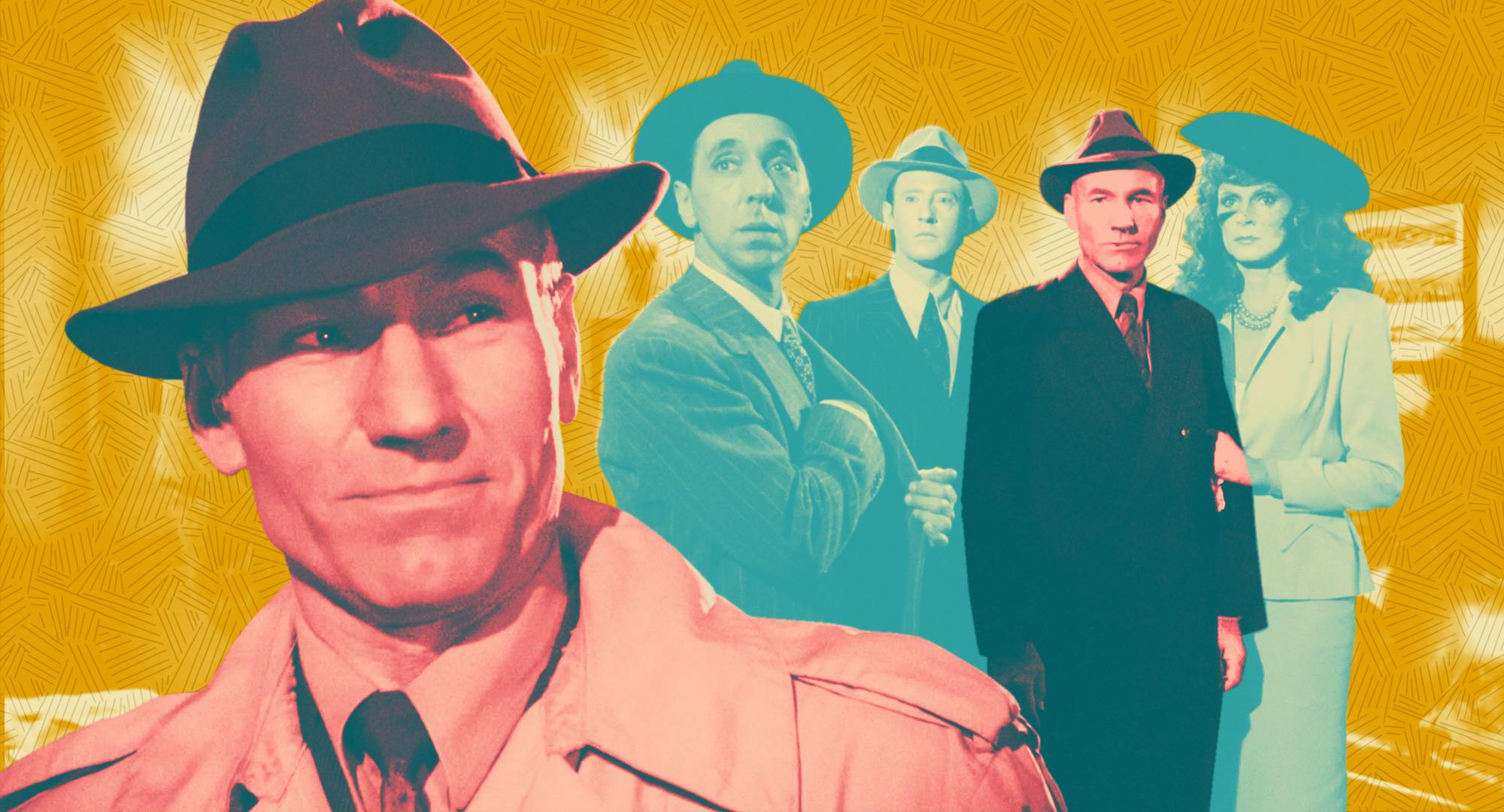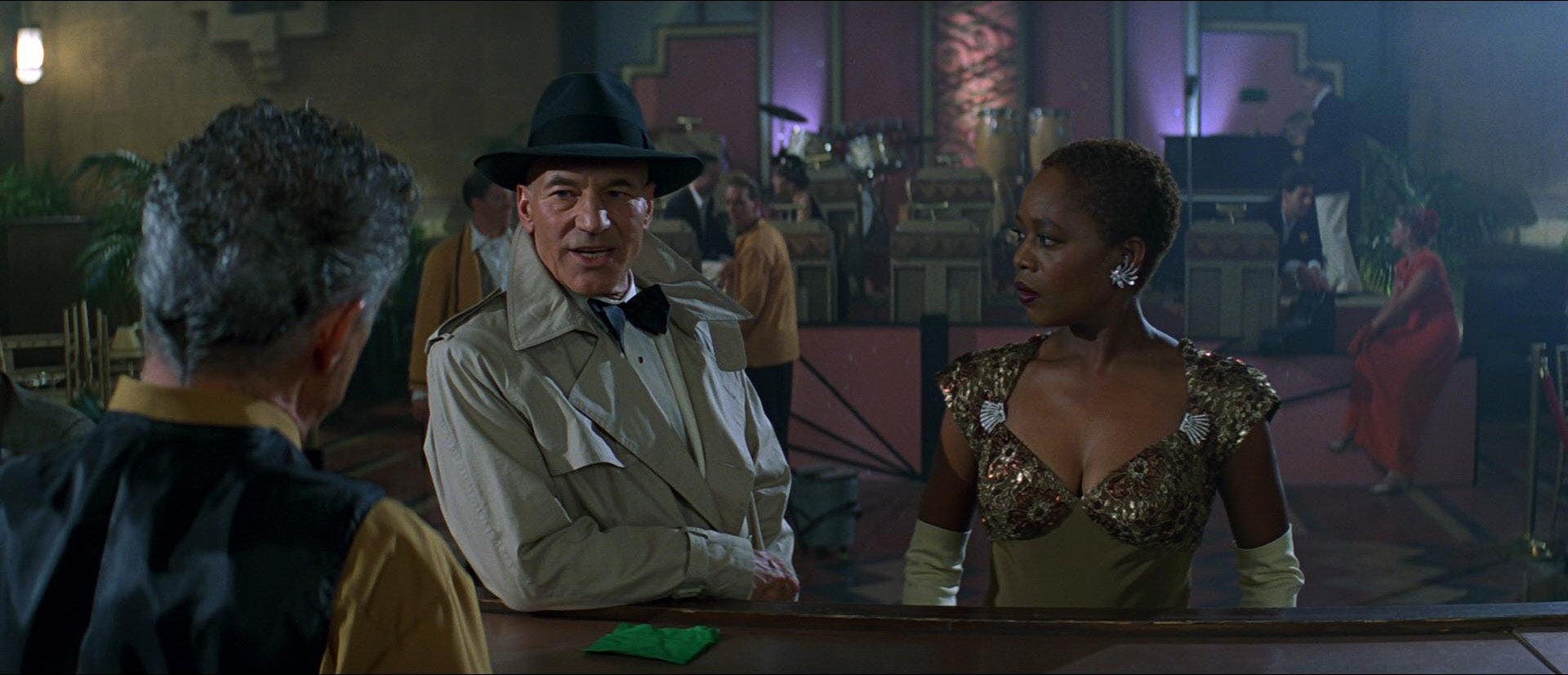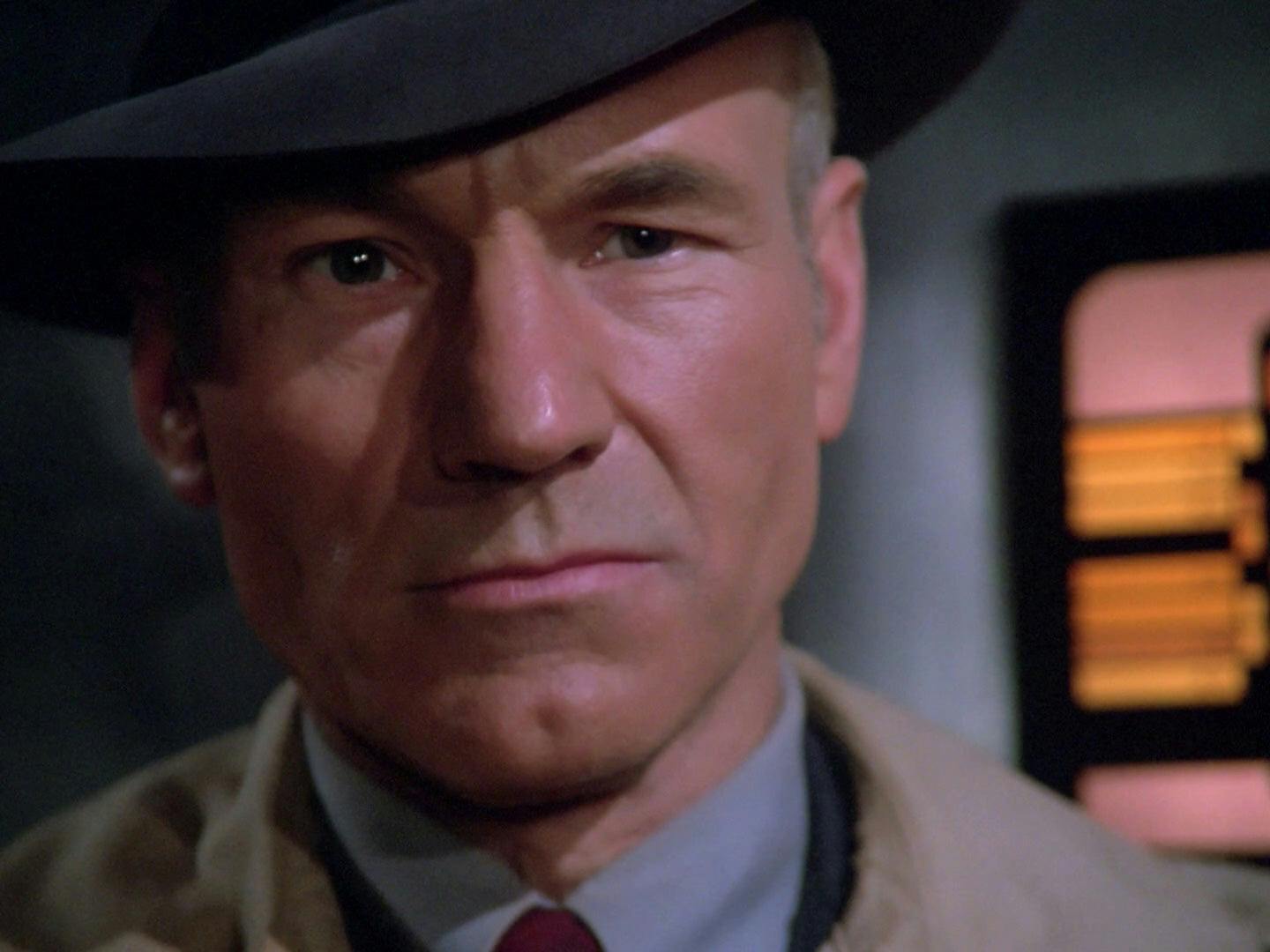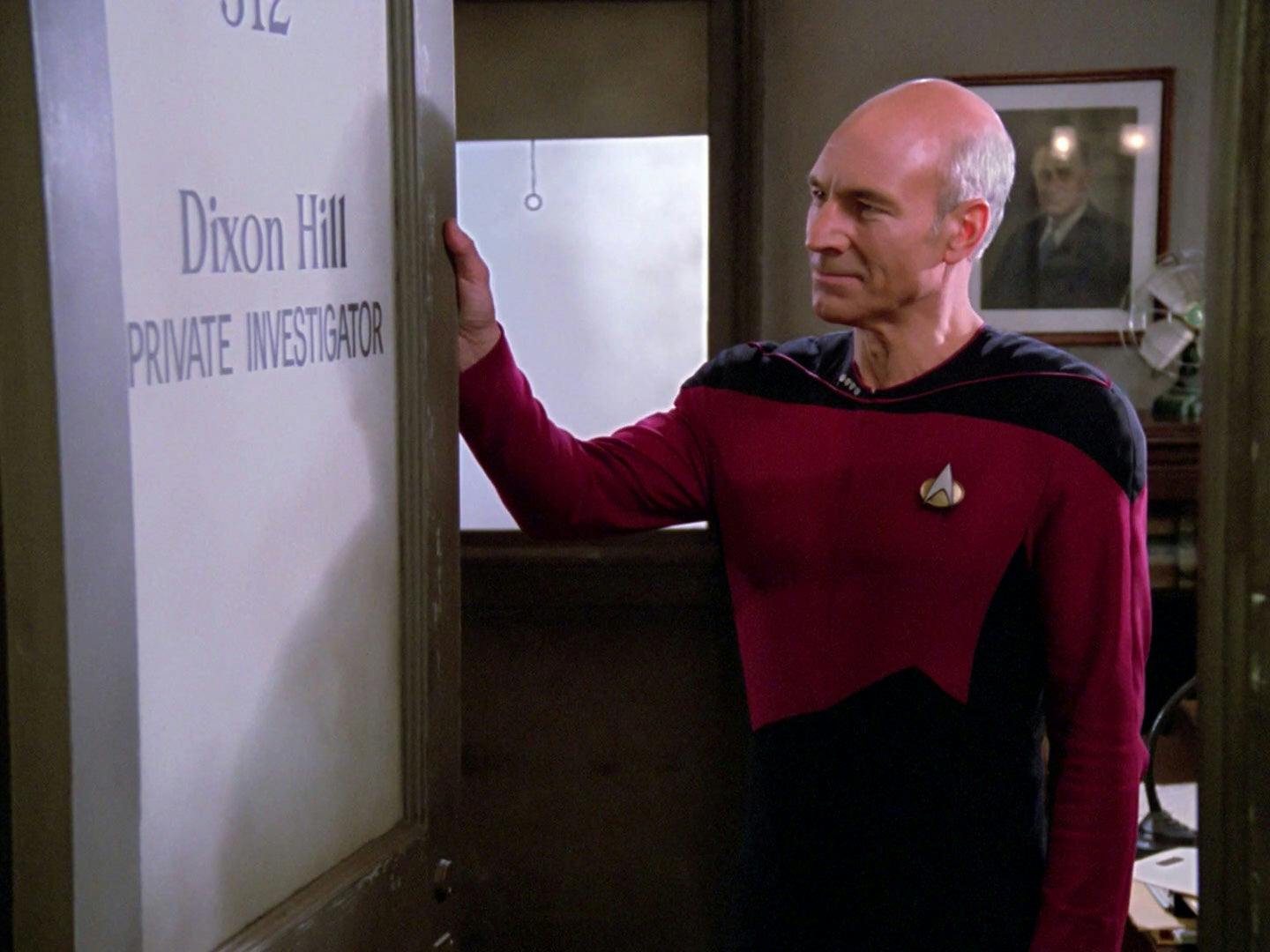Published Aug 10, 2020
Dixon Hill, Jean-Luc Picard, and Me
A crime writer reflects on Picard's favorite holodeck fantasy.

StarTrek.com
When weighing up the greatest gumshoes, the finest fictional sleuths, Dixon Hill rarely garners a mention. Sam Spade, Philip Marlowe, Magnum P.I, and Sherlock Holmes are all members of some pantheon of crime-fighting demi-gods. Why hasn’t Dixon received his due? It’s a little baffling, especially when you consider the loyalty of his fans.I was a kid when I saw Star Trek: First Contact. I’d never seen Star Trek before, believe it or not, but something about First Contact grabbed my imagination by the scruff of the neck. And halfway through the film, Picard entered the holodeck… and became Dixon Hill.This Dixon character was a hard-boiled detective, true. But more than that, he was a hardboiled detective who knew he was a character inside a story. Picard’s Dixon Hill didn’t just break the fourth wall, he exploded through it in a hail of dry witticisms and hot lead, and cheekbones that could cut glass. I was transfixed. Not only had I just had my first encounter with the holodeck, I’d also had my first brush with meta-textual storytelling: that is, a story that acknowledges that it is, in fact, a story and that story’s main character knew who he was — a detective. A very cool, very strange, very decisive, and very bald detective. I was besotted with Dixon Hill, but so, clearly, was Jean-Luc Picard. Suddenly, Picard and I had something in common.

StarTrek.com
We first meet Hill in “The Big Goodbye.” After an upgrade to the Enterprise-D Holodecks, we see Jean Luc Picard — the forthright, by-the-book, serious Jean Luc Picard — begin living out his fantasy of becoming his favorite private eye, and in doing so, become an actual fan. A nerd, if you will. Dixon is to Picard what Picard is to us. But why? Why was Picard so enamored with Dix? For a start, he possessed all the staples of the genre. A beleaguered secretary with whom he shared some kind of Moneypenny-esque ‘will-they-won’t-they’ tension. Impeccably tailored suits. Hats cocked at a jaunty angle that said this could fall off at any moment and I don’t give a damn.Then, there’s the fact that Dix has a lot of enemies. What does this say about Dixon’s credentials? Well, in the words of Jonny Lee Miller’s sublime Sherlock Holmes from Elementary, “There is, in my humble opinion, no greater compliment that an investigator can receive. It speaks to the quality of your work!” Good investigators ruffle feathers and go after big fish. It’s exhilarating to see Jean-Luc, a diplomat at heart, relish in flipping tables and punching people in the face (which, ironically, is closer to… well, Cowboy diplomacy.)How about cases closed? By all accounts, Dixon was prolific: we know, for example, he was the hero of a multitude of novels enjoyed by Picard. The Big Goodbye, The Long Dark Tunnel, The Black Orchid, The National Sheriff, The Listening Man, and The Parrot’s Claw. It doesn’t really matter that these stories are never actually shown; that they’re referred to with familiarity by Picard hints at untold adventures and intrigue lingering just out of sight. The Black Orchid, for example, is clearly evoking the famed Los Angeles Black Dahlia murder. We know instinctively what kind of case he lived through, even if we don’t see the specifics play out.

StarTrek.com
It’s clear why Picard loved Dixon Hill, but as an author there’s something else about this fictional detective that appeals to me. See, what Dixon Hill taught me about storytelling is that you don’t actually need to show the whole iceberg, you just need to show the tip and let the reader do the heavy lifting in imagining the rest. Star Trek gives us a tantalizing glimpse at the career of a fictional sleuth inside a fictional sci-fi universe, loved and obsessed over by a fictional Starfleet captain. But there’s something else in there, too. An implied author, their body of work, and their fans. It’s a sublime act of worldbuilding, and it was groundbreaking to witness as a kid who wanted desperately to be an author.Awhile back I was dead nervous, sitting across from a senior editor at Penguin Random House publishing in a crowded cafe. My literary agent and I thought we were on the verge of landing me a book deal, a sequel to my first book Loose Units — acrime novel,. “So, crime stories. Tell me. Who are your biggest influences?” the editor asks.And I stalled.I thought about this question a lot as I was writing Electric Blue, my new crime story. You see, my dad was a cop, and he became one because he wanted to be a detective — wanted to work his way up the ranks and become a hard-boiled sleuth, fishing for clues and warily eyeballing errant dames as they wandered into his office looking like nothing but trouble.Sound familiar?I’ll be honest… Electric Blue has inherited a lot of Dixon Hill’s DNA. It’s loaded with meta, fourth-wall-breaking moments where the characters in the book acknowledge they’re inside a story. The characters in Electric Blue based on myself and my Dad get lost, come into stories too late, or too early. Like Picard trying to show Guinan the joys of Dixon Hill, we make mistakes, miss our cues. Writing this book, I kept thinking back to Picard as Dixon.

StarTrek.com
There’s even a fictional detective in Electric Blue of my own making. My own Dixon Hill, if you will. I was drinking a can of hard seltzer one day, and before I knew it, Electric Blue had a hard-boiled gumshoe in it. And he was named Hard Seltzer. I’d done it. I’d created a Dixon Hill of my own. Picard got to live out his childhood fandom of Dixon Hill as an adult in the holodeck, and I got to live out my childhood fandom of Dixon Hill in a paperback.Electric Blue is my acknowledgment, my admission of how much Dixon affected my young mind. And as I sat there a few weeks ago, clutching the very first copy of Electric Blue in my hand, I realized that if it hadn’t worked out, maybe I could have taken a leaf from Picard’s book.Freeze program. Go back. Try again.That’s what Dixon Hill would do.
A Timeline Through the Star Trek Universe
Paul Verhoeven (he/him) is a writer and comedian, and his book Loose Units is out through Penguin Publishing. He hosts Steam Punks on the ABC, hosts the Loose Units spin-off podcast, and his second book, Electric Blue, is out through Penguin Publishing later in 2020.

